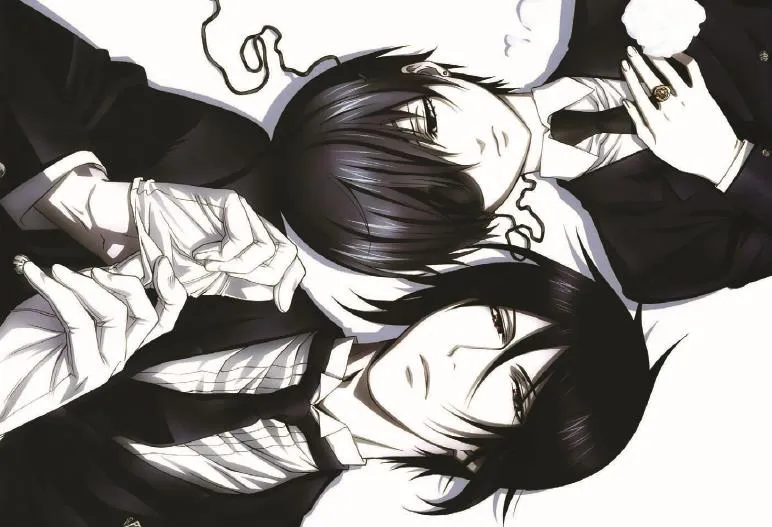GIRLS LOVE BOYS' LOVE
2014-02-25BYCARLOSOTTERY
BY CARLOS OTTERY
GIRLS LOVE BOYS' LOVE
BY CARLOS OTTERY

Homoerotic Japanese comics all the rage among young Chinese women
一入腐门深似海,从此良知是路人?
If I told you vast numbers of Chinese teenage girls, spend signif i cant amounts of their downtime reading Japanese gay porn, would you be surprised? Well, you shouldn't be, because they do—in their droves. The homoerotic stories range from the mundane to the highly esoteric, but plots often follow a familiar pattern: a nascent homosexual relationship between two young men develops, with one of the lovers initially reluctant before fi nally giving in to his hiddendesires—often this is part of an awkward love triangle.
Yaoior Boys' Love (BL) comics,danmei(耽美) in Chinese, are largely written by women and for women and focus on sexual relationships between, usually, young men and are invariably highly erotic and very often graphically pornographic. The exact numbers of young Chinese girls who read BL is unclear but in the 15-24 age group, it is a growing if not majority trend in major cities. Kat Tsang, a 21-year-old Cantonese student studying marketing at the Beijing Institute of Graphic Communication, started buying BL comics when she was just 14 years old. Since then, she has read over 200 but has cut back recently because of her schedule.
“I started secretly just at home; I remember there was one time, after I went to high school: it was a boarding school, so all the girls were together, and I remember one night we were gossiping. Maybe, at some point, we just started to talk about it…and I realized a lot of us were into it. Not all of us, maybe 30 or 40 percent,” she says.
Emma Zhou, a 19-year-old from Xiamen studying English broadcasting at the Communication University of China, has many friends and classmates that are are fans of BL comics but claims that she is not particularly interested in the stories as, “Being a girl makes it impossible for me to really experience it…It's kind of annoying to me.” She does however attest to the immense popularity of BL and even suggests there might be some regional differences among its popularity: “I'd say around 40 percent [read it]. And the percentage varies from place to place. Modern cities such as Shanghai, Beijing, Nanjing, and Hong Kong have more BL lovers. Southern parts of China, generally speaking, have more fans than the North. Take where I grew up for example, during my middle school to high school time, BL comics and novels were the hottest topic among girls, hotter than fashion.”
Despite the obviously explicit sexual nature of these stories, many of the girls claim they read the tales for the escapism, the fantasy, and the romance, or even the drawings of the artists, not for the sexual titillationper se. Tsang broadly claims the same: “It's like pure art. A lot of these women don't really like these guys. We don't put it in a really sexual way...It is not really sexual. When we watch real porn and someone has a really good body, then maybe…You cannot turn me on by watching it (BL). If I am with a man and we are watching it, it won't really turn us on, but it might be like, oh, this might be a nice position to try or something like that.”
Zhou suggests that the popularity of the comics might be born out of a sort of sexual frustration: “I'd say many who like BL have sexual fantasies but also think it is inappropriate. If she is struggling with such thoughts, a girl might like to read BL.” She adds, “If the character is being raped, she would feel raped. If the character feels enjoyment, she would feel the joy as well. However, all these can bring the girl a sense of embarrassment and guilt. But, watching two boys making out, no worries!”
ONE OF THE MORE CONTROVERSIAL ASPECTS OF THIS “COURTING” IS THAT IT OFTEN INVOLVES THE RELATIONSHIP BEING CONSUMMATED WITH RAPE
Generally the plots involve aseme(dominant, top partner) pursuing auke(passive, bottom partner) who is shy at fi rst but eventually gives in. One of the more controversial aspects of this “courting” is that it often involves the relationship being consummated with rape; only it's rape framed differently. Instead of being setup as a sort of sexual destruction, a vicious stealing of innocence, it is presented as symptomatic of a deep love, something superior and somehow more signif i cant than regular love. Fantasy is one thing, but it does not take too much of an imaginative leap to suggest that such stories attempt to justify or legitimize rape.
Tsang's opinion on that matter is unclear. Outlining a classic plotline, she says: “There is always a stronger one with an attraction. Then the weak one runs away…Then, there is a struggle—a really, really long struggle. And then the stronger one just goes for it and forces it, basically rapes him. Then they are together, and as time goes by the other one gets stronger and stronger [into the relationship].” At the suggestion that this is not a particularly pleasant plotline, she almost reneges on her description. “It is not forced. It's not raping. Ok, it is a little bit forced,” she says.
Ultimately she attempts to explain away the rape fantasy as a desire for domination that exists among some women in contemporary Chinese society: “For a lot of Chinese girls they want the man to dominate their life. A lot of girls actually like the dominance, so the fi rst time [in the comics] reminds them of theirfi rst time, which is really sick in my opinion. It's my body. I'm the only boss of my body...Oh, but when women talk they say ‘I would never let him do that…I would never let him do that. I would never do it that way.' But when it comes to reality? Come on!”

TWO MEN ENTERING INTO SUCH A TORTUROUS RELATIONSHIP HAVE TO IGNORE THE CRUEL CONSTRAINTS OF A WIDER SOCIETY, AND THEIR LOVE IS ACCORDINGLY ASCRIBED A RICHER MEANING
It's no secret that pain and domination have long been part of the sexual repertoire both in terms of reality and fantasy, and some would fi nd it trite to suggest that the rape fantasies created on BL pages were anything other than this. “To begin with this ‘forcing' that then gradually develops to the ‘love' level gives the stories twists and turns. It seems to be more real. Besides, I think people just naturally like S&M. Maybe the reason why this is popular is the same as people's fascination with S&M,” says Zhou.
Regardless of whether these comics are pure fantasy or if there is a sexual element, it is unclear why there issuch a focus on homosexuality. Many girls suggest that the focus on the gay plotline elevates the fantasy of the romance and somehow deepens it. As the love that dare not speak its name, it is forbidden. Two men entering into such a torturous relationship have to ignore the cruel constraints of a wider society, and their love is accordingly ascribed a richer meaning.
THERE IS NO DISCUSSION OF COMING OUT, NO PARENTAL PRESSURE, AND NO EXPLICIT SOCIAL EXAMINATION OF WHAT HOMOSEXUALITY MEANS AT ALL

The Chinese girls that read such comics are part of a wider subculture calledfunü(腐女, literally, rotten women). The nearest English equivalent term would perhaps be the extremely derogatory “fag hag”. These women have an intense interest in many aspects of gay culture. They might have a wealth of gay friends or perhaps will reframe certain television programs (particularly British ones, oddly) within a highly homoerotic narrative. Take the BBC's recent TV seriesSherlock, which has received widespread success in China. Chinesefunülove to re-imagine Benedict Cumberbatch's Holmes performing homosexual acts on Martin Freeman's Watson. There are numerous forums dedicated to such fantasy alongside a signif i cant amount of fan-f i ction.
No doubt it is a fun game to play, and Chinesefunüwouldn't be the fi rst to playfully toy with such reinterpretations. On the surface,funüdoesn't appear a term that many Chinese would like to embrace;“rotten women” is hardly a fl attering term. Tsang, though, is comfortable with the label: “Oh yes, it is hard to say why I like the gay thing; I don't hate guys, but I don't have any [straight] male friends, mainly girls. When it comes to friendship my personality is very tough. All of my boy friends are gay. All of my male friends are gay. But I don't know why. I guess I accept it and enjoy it.”
Interestingly, if the worship of BL comics is predicated around a love for homosexual culture or is seen as somehow being more romantic due to its forbidden color, then it is an aspect that is almost entirely lacking in the comic books themselves. There have been a few storylines that go against the norm and have been praised for their realism, but largely homosexuality is not discussed. There is no discussion of coming out, no parental pressure, and no explicit social examination of what homosexuality means at all. In fact, other than the endless smattering of romance and the lashings of homosexual sex, you wouldn't know that these youngsemesandukesare homosexual at all. Indeed, perhaps they're not.
The anal sex is largely depicted as an act that occurs face to face, missionary position, the two men gazinglovingly into one another's eyes. Once again this is clearly sex to titillate a very particular certain type of female longing, as Tsang points out: “Oh, but that is the comic book way, it is face to face. In real porn it is not. The comic way is face to face, because that is what women like: the missionary position. Actually, the comic books are aimed at women, and it is easy for the artist to paint them [this way]. People can feel more emotional.”She goes on to say that even oral sex is relatively rare as it does not necessarily always tap into female fantasy:“Yes, there is some oral sex. Not that much because the gay comics are more for women.”
OVER THE LAST 10 YEARS, THERE HAVE BEEN COUNTLESS CHINESE NEWSPAPER HEADLINES CRANKING UP THE MORAL PANIC
Over the last century, China as a nation has undoubtedly had a very conservative attitude towards sex, at least in public, and it seems that at some level teenage girls might be using these magazines to gain an understanding of men's bodies and how sex works, or even to fi nd a form of sexual release that is somehow safe: “BL novels are rather sexual…pretty hardcore…It's exciting. In China we don't have much sex education; teenage girls are curious about sex. However, most of them think sex is inappropriate and dirty, and they don't want to be attracted to such things. They might think the thought of having sex with a boy is bad. So, better to read a BL to release,” says Zhou.
Tsang says all this under the auspices that, when she was 18, a small but signif i cant number of her university classmates still believed girls could become pregnant via kissing, but it is perhaps more worrying that this lack of sex education might be being replaced by kinky Japanese comics full of idealized impossible sex and rape fantasies. “In China, many girls are raised in conservative families. The teachers won't tell them; the teachers aren't open, so for a girl, you are a teenager curious about the other gender, and this is the reason why the comics are popular. It's because you can actually learn something about it, about the men. A lot of my friends gained knowledge about sex from comics,” says Tsang.
Their popularity notwithstanding, the creation and dissemination of BL comics is, like so many things, banned in China, it's classif i ed as pornography and this can lead to heavy punishment. Over the last 10 years, there have been countless Chinese newspaper headlines cranking up the moral panic, suggesting BL stories poison the minds of young Chinese girls and, somewhat predictably, convert them to homosexuality. The peak of the BL media backlash occurred in 2007, and since then, there have been a spate of arrests.
In 2011, the Public Security Bureau of Zhengzhou, Henan Province, became suspicious of a BL website that had 60 million registered users, so they registered a VIP account to further observe the content. They soon closed the site down and arrested its founder and 20 contributors. However, rather than cracking down on a gang of illegal porn barons, they in fact arrested a score of girls living in different parts of the country, mostly aged from 17 to 20 years old, who were, by all accounts, incredibly ordinary young women. Police and local media interviewed the young girls, all of which answered in a very matter-of-fact fashion. On being asked by a reporter what was wrong with what she wrote, Lily, a BL writer from a rural village in Hubei Province said: “Well, it shouldn't be the homosexual parts...It should be that I was too sexual. But, although I think my writing on sexual intercourse went a little overboard, it wasn't too bad.”On being asked her inspiration behind her storylines Lily remained succinct: “Bullshitting. Sometimes when I hit writer's block, I browse online forums, and then I can continue with my writing…Having read too much of these guy-to-guy romances, they become the same as heterosexual romance; to me it is ‘fast food' culture.”
Another of the girls, Xiao Hui had been writing BL stories since she was just 18, and was equally blasé when questioned. The police off i cer asked her why she madedanmei, to which she replied, “I am just curious. I am not very into it either. But it gets a lot of hits. Since I was a kid, I have always wanted to be a writer.”
Ultimately, it seems that BL serves as simple, though not particularly innocent, escapism for young girls entering womanhood. And, while the media will continue its scaremongering as to the effects of these risqué comics and the authorities might proceed to arrest inexperienced young female writers, for now, many Chinese women, just like Kat and Emma, will continue (funüor otherwise) to read and write fantasy, erotica, Boys' Love, Girls' Love and whatever else they damn well please.
